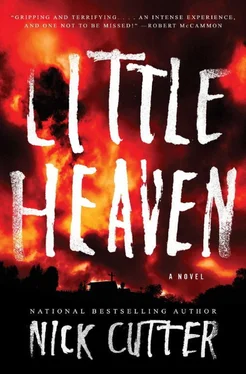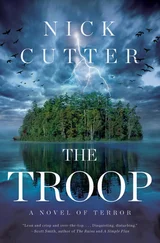Humerus? Minerva thought, her mind taking a sickening lurch. There’s not a damn thing humerus here—hey-o! Gimme a rim shot, Doc Severinsen!
The flesh was slit back from his nose in petals, the strips tacked to the wood. The musculature of his face twitched, his eyes massive without anything to cover them; they peered around with a vaudevillian shock that forced a cascade of giddy giggles to bubble up Minerva’s throat. It was the only way to get rid of the chest-splintering pressure building up inside of her.
It took a moment to grasp the final horror. The source of that spluttering.
The man’s neck had been slit, but he was still breathing. The man’s lungs heaved, forcing breaths out, the air blllpphhphhph -ing from his severed windpipe. Minerva watched the erratic beat of his heart through the naked bones of his ribs; his innards still pushed stubborn shreds of food along.
What infernal sorcery was keeping him alive? Was it the same that kept her own heart beating every time she tried to off herself?
She grabbed a hatchet from the wall rack. She took two steps toward the man and brought it around in a wicked arc. It buried in the man’s neck, widening the slit. His body thrashed, blood spraying. She pried the blade out of the wall and swung it again and again until the man’s head was completely separated from his body: it hit the floor and rolled under the table like a lopsided bowling ball.
Minerva stared at Micah, breathing hard. Her face was flecked with blood.
“Merciful,” Micah said after a span.
Noise from under the table. The man—no, the head —was laughing. The gibbering sounds of lunacy you might hear at a nuthatch.
That laughter unseated something in Minerva—it filled her with panic and sorrow and, yes, rage. She kicked over the table and swung the hatchet at the giggling head. The blade cleaved the skull dead center, splitting the bone; there came a hiss as pressure forced a chunk of gray matter through. Minerva threw the stove open and hurled the head inside with the hatchet still embedded in it. The head continued to howl laughter, and the pitch ascended as its lips began to melt. Minerva slammed the stove door. Fire flared behind it; there came a small explosion as the juices inside the man’s head heated up, blowing out part of his skull. The giggling ceased.
They gathered outside. Ebenezer collapsed against a fallen log.
“How?” he asked helplessly.
“It’s the work of that thing.” Minerva was doubled over, breathing in huge gulps. “The Big Thing. The Piper. Whatever you want to call it.”
The smoke rising from the chimney now had a meaty smell.
“I don’t know if I can go through with this,” Minerva said. “I thought I could, Shug, but…”
“I understand.”
“I’m scared.”
“I understand.”
LATER, MICAH WALKEDfrom the fire they had stoked a ways from the cursed shack. He stared through the trees in the direction of Little Heaven. They weren’t far now. It would all come to an end of sorts. He was ready for that. He had one last fight in him—and if he had to, he would fight alone. Petty was his blood; in the end tally, neither Minerva nor Ebenezer owed him a debt. Their ledgers were clean with him.
But Petty—yes, he owed her. A parent always does. He stared into the formless dark, and a memory molded itself within it. Petty was young at the time, two or three years old. This was before Ellen entered her endless sleep. But that day she wasn’t with them; it had been Micah and his daughter, alone. He’d been working in the paddocks when he spotted a caterpillar—a big brown one wriggling along, doing its caterpillary thing. He called Petty over and drew her attention to it.
“Touch it,” he said. “It is… fuzzy.”
Micah simply wanted her to feel the soft, bristling, undulating little carpet of fuzz that is a caterpillar. Pet put her finger on it and pressed down. She wasn’t big in human terms, but to a caterpillar she was gargantuan. The caterpillar curled into a ball. He snatched Pet’s hand away. “ Gentle. ” She gazed at him with no comprehension. Micah thought the caterpillar would be okay—it had just turtled up defensively. It would uncurl once the threat was gone. But the wind picked up and blew the caterpillar across the boards, light as a dried seedpod, in a way that told Micah the life had drained out of it. It happened so quickly. A thing was alive; next it was dead. Petty lost interest and ran off after her ball. Micah stared at the caterpillar a long time. It was the first thing his daughter had killed that he was aware of. Micah had guided her to the act. And yet life went on. It always did. Pet was chasing a ball. The birds were singing. The horses nickered in their stables.
You tell yourself it’s just a caterpillar. The world’s full of them. Which is true. But the world is full of us, too. And any of us can be lost—or taken—at any minute.
Micah thought about endings. Some were abrupt, like the way that caterpillar’s life had ceased. Some took longer, and you could see them coming from miles off. In so many ways, Micah wanted it to end. He felt every one of his years. He was old and bone-weary. His body ached; his mind was plagued. Everything he loved had been ripped from him, and he deserved it. Guilt and regret were different qualities, yes, but still tightly wed. You could not outrun your past. Your history was a lonely hound pursuing you over field and fallow, never resting, always hungry, tracking you relentlessly until one night you heard its nails scratching at your door.
I am coming, Pet , he thought. Please just hold on a little longer. If I can, you can.
PART SIX
THE DEVIL IN THE ROCK
1966

NATE WAS STILL AWAKE.Everyone else was asleep.
Only a few hours had passed since the one-eyed man had come back. He and Mr. Redhill and Mr. Fairweather and Mr. Langtree had gone off in the truck to get help. They hadn’t made it far. In fact, they were still within earshot when Nate heard Mr. Redhill start to scream. He thought it had been Mr. Redhill, anyway. It was too dark to see, the truck too far away by then, and anyway, when people scream—even full-grown men—they all tend to sound the same. That wasn’t something Nate would have guessed, but he could say so now. Only the one-eyed man had returned to Little Heaven alive.
Now Nate was in the mess hall with his father, the three outsiders, and Ellen—she had told him her name, so she wasn’t an outsider to him anymore. A bigger group was over in the supply warehouse. A few stragglers were standing watch at the gate.
After the one-eyed man came back, a lot of people tried to get into the chapel. Sanctuary was the word Nate had heard. But the chapel was locked. The Reverend wouldn’t answer his door, either. What did it matter? Nobody cared what the Reverend had to say now. It’s about time , Nate thought. He had never really liked Reverend Flesher. He reminded Nate of a door-to-door salesman: he spread out his wares on your living room rug, and they weren’t much good, all scuffed and cheaply made, but he pressured you to buy them anyway. Nate was glad the Reverend had lost some of his control. Nate could say that now, couldn’t he? Sure. He could say or think almost anything. And that was a scary thought.
Everyone had questions for the one-eyed man, too. A lot of those questions had been screamed into the one-eyed man’s face, and they were less questions than accusations. He didn’t answer any of them. It was as if whatever had happened out there had temporarily melted his brain. That was a scary thought, too, because the one-eyed man seemed tough. Steel-belted, his mom would say. If whatever had happened out there was bad enough to do that to him, Nate figured it had to be really bad.
Читать дальше













